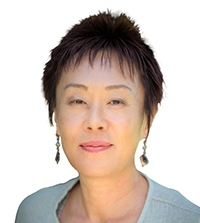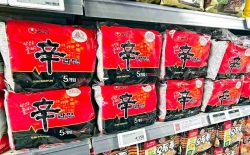19:40 JST, May 19, 2022
“You need more water,” my next-door neighbor says decisively. We can both see clearly that the grass is greener, thicker and healthier-looking on his front yard, compared to mine. I have to admit that the manicured, evenly green lawn is nice; but I also know that the spring weather will quickly turn into dry summer heat, and that, to keep his lawn the envy of the neighborhood, he will need to turn his sprinkler on nearly every day and pay a hefty water bill for the rest of the summer.
It all seems a bit excessive to me, who grew up playing on a bare packed-dirt yard the size of a cat’s forehead (which is a Japanese way of saying “very small”) and being told constantly about the virtue of conserving. So I compromise by watering my lawn just enough to keep it sort of green, with a few patches of brown here and there.
I have been told that it is very important for middle-class American homeowners to maintain the front appearance of their homes. In Southern California where I live, as well as many other regions of the United States, a green front lawn has traditionally been the most important element of this middle-class presentability. It is exasperating, however, how much work it really takes to maintain it. It must be watered properly and trimmed regularly during the long growing season; no matter how careful you are, the water bill skyrockets during the hottest months.
In the wintertime, the lawn needs to be fertilized, aerated, raked and reseeded. If you don’t do everything right, it will turn brown and die, weeds will take over and fungus will pop up. The most problematic part of all this, by far, is water. In this arid region, where most of the rainfall is concentrated in the winter months, every square foot of lush green equals gallons and gallons of water, sprinkled, poured and dripped all over our yards.
“That’s got to stop” is the message we have been getting for quite a while. Because of the effects of climate change, we have been under extreme drought conditions, more or less continually, for the last two decades. Restrictions have been imposed during many summers to lower outdoor water usage, limiting the number of days per week in which residents are allowed to water their yard. This inevitably leads to dry, brown lawns, and some homeowners — upset by the site of their ruined landscape — defying the orders and watering their yards more frequently. They better watch out, though: some municipalities hire patrols to catch these violators, who are subsequently hit by a heavy fine.
The lush green expanse of the front lawn, graceful palm trees rustling overhead, colorful flowers blooming along the fence, a glimpse of sparkling water in the backyard swimming pool — these landscape features make affluent Southern-California neighborhoods a mesmerizing vision to behold. The popular lifestyle in our mild, sunny climate is to spend days and evenings in the beautifully landscaped outdoor space much of the year, playing with kids, inviting friends for a barbecue, hanging lazily at the pool.
It is the embodiment of the American Dream, in a SoCal style. But the extended drought conditions have reminded us of the fragility of this dream. Everyone knows by now that it is not sustainable any longer (if it ever was) to waste water — one of the most precious resources in our region with its ever-growing population — to fill the private pool that’s used once or twice a week or to feed plants that have no business being there except for purely ornamental reasons.
At the same time, I see people resisting the change. To me, the idea of having a lawn that’s impeccably green all the time seems like an unrealistic extravagance; but for those who grew up with it, what dies in the prolonged drought is not just the grass on their front yard, but people’s very way of life, which has taken vast amounts of time, care and money to maintain.
The Metropolitan Water District of Southern California, which provides water to urban areas in the Los Angeles region, just announced that, starting June 1, homeowners can only water their outdoor areas once a week. While my own city, situated further inland and dependent on different water sources, was not affected by this decision, it is only a matter of time before we, too, will see some sort of restrictions this summer.
My next-door neighbor is already upset by the possibility of having to let his lawn die in the summer heat and contemplates aloud whether it is a risk worth taking to continue watering his lawn as he sees necessary. Another neighbor just replaced their lawn with artificial turf, which will require no watering or maintenance for years to come. One of my friends shrugs her shoulders in a silent “I told you so,” because drought-resistant plants in her yard don’t need much water at all, and implores me to do the same.
Artificial turf and sustainable landscaping both have merits and are decisively easier to maintain than traditional lawns. But I’m still sitting on the fence, because, as the token of my ambivalent nod toward middle-class Californian life, nothing seems quite as fitting as the sort of green lawn that graces the front of my home. We’ll see how much longer I can sustain this non-committal position this summer.

Sawa Kurotani
Kurotani is a professor of anthropology at the University of Redlands.
Top Articles in Editorial & Columns
-

40 Million Foreign Visitors to Japan: Urgent Measures Should Be Implemented to Tackle Overtourism
-

University of Tokyo Professor Arrested: Serious Lack of Ethical Sense, Failure of Institutional Governance
-

Policy Measures on Foreign Nationals: How Should Stricter Regulations and Coexistence Be Balanced?
-

China Provoked Takaichi into Risky Move of Dissolving House of Representatives, But It’s a Gamble She Just Might Win
-

PM Takaichi Should Help Young Japanese Break Seniority Barrier to Vitalize Politics
JN ACCESS RANKING
-

Japan Institute to Use Domestic Commercial Optical Lattice Clock to Set Japan Standard Time
-

Israeli Ambassador to Japan Speaks about Japan’s Role in the Reconstruction of Gaza
-

Man Infected with Measles May Have Come in Contact with Many People in Tokyo, Went to Store, Restaurant Around When Symptoms Emerged
-

China Eyes Rare Earth Foothold in Malaysia to Maintain Dominance, Counter Japan, U.S.
-

Prudential Life Insurance Plans to Fully Compensate for Damages Caused by Fraudulent Actions Without Waiting for Third-Party Committee Review




















